Just like the “two Americas” that many U.S. analysts saw during the 2016 presidential campaign, the Macron-Le Pen match that will take place on May 7 in the French presidential election runoff will have all the ingredients of a clash between “two Frances.”
The front-runner Emmanuel Macron, who won 23.8 percent of the votes in yesterday’s first round, appeals to younger, pro-European, well-educated professionals. His challenger Marine Le Pen managed to capture 21.4 percent and calls herself the “advocate” of France against terrorism, illegal immigration, and especially “the establishment;” her support comes mainly from poorer and more rural voters, wary about their future. Le Pen, whose Front National has been playing on people’s fears for decades, will be painting the 39-year old Macron as a cosmopolitan elitist who does not understand the mood and the problems of his country. However, the former investment banker and economy minister has now received the blessing of all mainstream parties, from the center-right (including the Republican candidate, François Fillon, who failed to make it to the second round) to center-left. The only holdout so far is the hard left-winger Jean-Luc Mélenchon, who got 19.6 percent of Sunday’s vote.

Like Donald Trump and Nigel Farage, the former leader of the anti-European U.K. Independence Party, Le Pen will undoubtedly continue to portray herself as the representative of the under-privileged, those who have been sidelined (or even victimized) by globalization. She will stigmatize foreigners and Muslims, and will try to appeal to voters’ nostalgia for a long-gone France. In 2002, when her father and Front National founder Jean-Marie managed to reach the runoff, he obtained 17.8 percent of the popular vote, against 82.2 percent who voted for Jacques Chirac. This time, she will probably fare better, but she is unlikely to actually win—so far, not a single poll has made her the winner in a face-off with Macron. Another question is about those who chose to abstain: a total of 10.2 million people in the first round, which is more than those voting for Macron (8.5 million) or Le Pen (7.7 million). Overall, though, turnout was still high, at 75.7 percent.
A SECOND CAMPAIGN
The next two weeks will see a different campaign from the recent one, with a much more presidential Macron. Although his being the frontrunner is a remarkable achievement (only one year after launching his own party, En Marche!) and his stature is boosted by his rivals’ endorsement, he faces a tough opponent. Not only has Marine Le Pen nothing to lose in this race, she is also aiming at winning seats in the upcoming parliamentary elections. During the coming two weeks, both candidates will stage rallies all over France and will appear on traditional and social media. The final televised debate, which normally takes place just a few days before the runoff, will—as it always does—attract tens of millions of viewers.
THE NEIGHBORHOOD
Le Pen, and indeed several other candidates such as Mélenchon, have used the EU and Europe as scapegoats for France’s problems. Macron, on the other hand, has been firmly consistent in his pro-European views that have delighted other EU leaders, and German politicians in particular.
As polls show that 67 percent of French people want their country to remain part of the EU, this election demonstrates that Macron’s views have prevailed. After Germany’s September elections, both countries will have to work together to relaunch the Franco-German partnership, and perhaps an overhaul of the EU, without the U.K.
As polls show that 67 percent of French people want their country to remain part of the EU, this election demonstrates that Macron’s views have prevailed.
TAKE 3 AND Take 4
The third and fourth rounds will take place between June 11 and 18, when the French vote in parliamentary elections. Despite the fact that France has a presidential system, the real government of the next five years (both the president and the National Assembly have five-year terms) will be determined in the legislative elections.
The prime minister—whose job is subordinate in power to that of the president—is usually the leader of the largest party in Parliament. But a President Macron, with his new and still unseasoned party (this would be even more true of Le Pen), if elected on May 7, will have to build a coalition of parties to govern effectively. This is the real risk—and huge potential benefit—of this year’s French electoral season: For the first time in two generations, the mainstream political parties will have to work together for the good of the country.
WHAT GOVERNMENT?
Whether a coalition government under Macron will work in the long run is a very open question, as both the extreme left under Mélenchon and the extreme right remain forces in the political arena. Meanwhile, the traditional mainstream parties—the right of center Les Républicains, and the left of center Parti Socialiste—who were the main powerbrokers in the Fifth Republic and have both been humiliated in this disruptive election, will be spending some time settling scores.
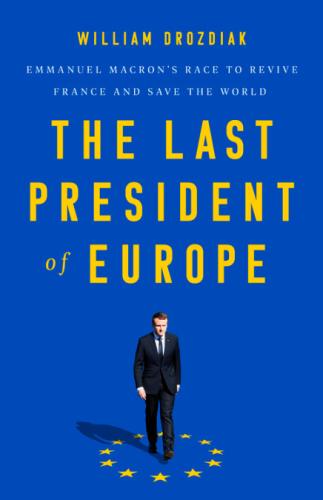

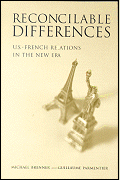
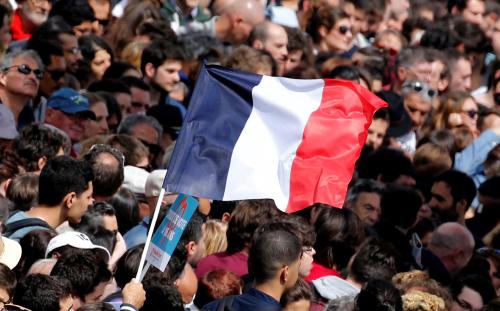


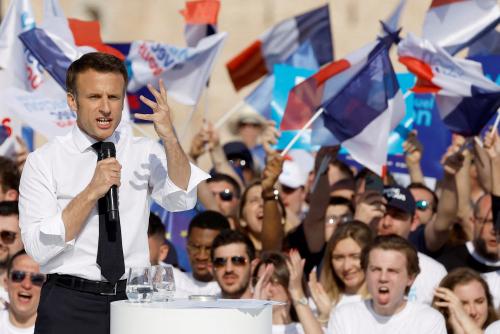
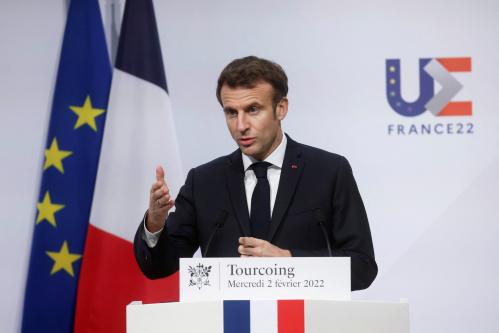
Commentary
Two versions of France, now racing toward the finish line
April 24, 2017